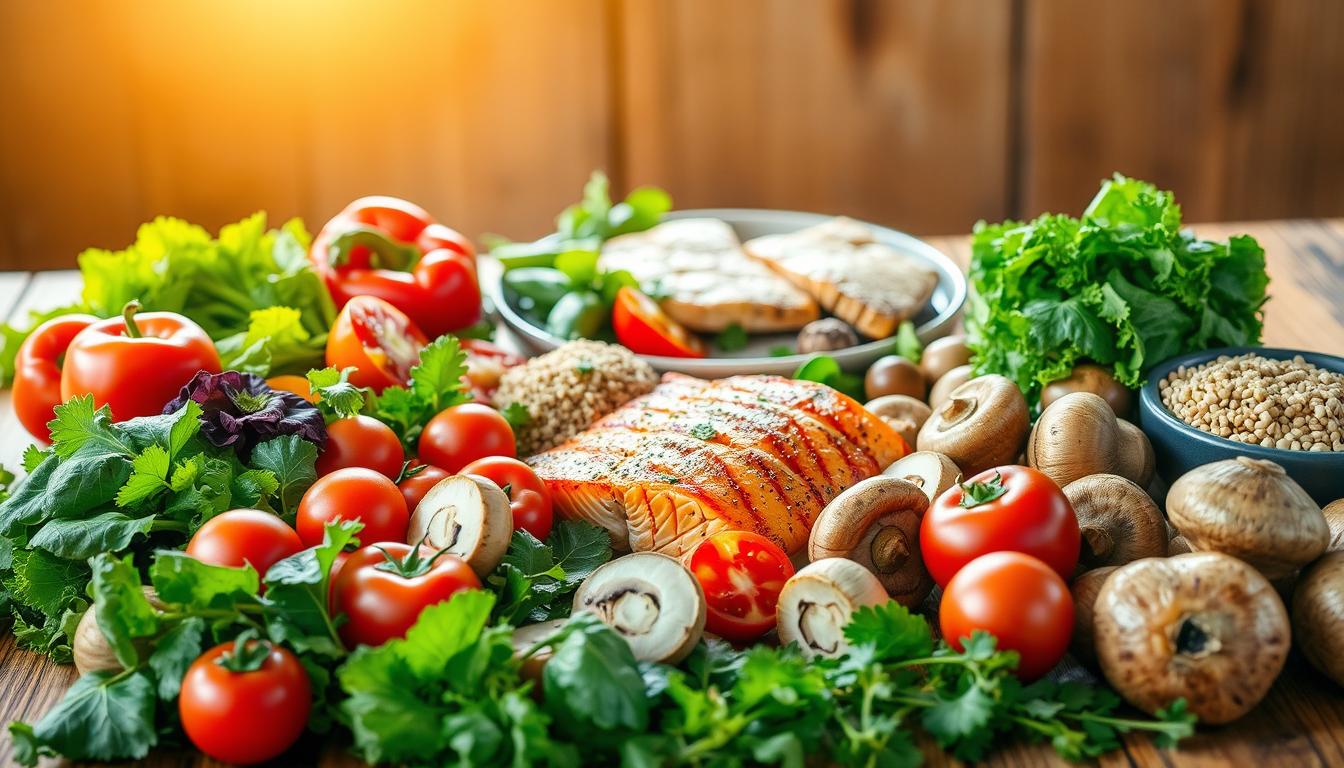Nearly 25% of adults in the United States are affected by fatty liver disease, a condition characterized by excessive fat accumulation in liver cells. A well-planned diet can significantly impact liver health and overall well-being.
A healthy eating plan can help manage fatty liver disease stage1, reducing the risk of progression and promoting overall health. By making informed dietary choices, individuals can take a proactive approach to improving their liver health.
Key Takeaways
- A healthy diet is crucial in managing fatty liver disease stage1.
- Informed dietary choices can significantly impact liver health.
- A well-planned eating plan can reduce the risk of disease progression.
- Dietary changes can promote overall health and well-being.
- A proactive approach to diet can improve liver health outcomes.
Understanding Fatty Liver Disease Stage1
The liver plays a vital role in metabolism, and fatty liver disease occurs when it becomes overwhelmed with fat. Fatty liver disease stage 1 is a condition where there’s an abnormal accumulation of fat in liver cells, potentially leading to liver damage if not addressed.
What Causes Fatty Liver Disease
Several factors contribute to the development of fatty liver disease, including obesity, insulin resistance, and excessive alcohol consumption. Poor dietary choices, such as consuming high amounts of saturated fats and refined sugars, can also exacerbate the condition.
| Cause | Description | Impact on Liver |
|---|---|---|
| Obesity | Excess body fat | Increases liver inflammation |
| Insulin Resistance | Body’s cells don’t respond to insulin | Leads to fat accumulation |
| Poor Diet | High intake of saturated fats and sugars | Contributes to fatty liver development |
Why Diet Matters for Liver Health
A well-balanced diet is crucial for managing fatty liver disease. Nutritional interventions can help reduce liver fat, inflammation, and damage. Foods rich in antioxidants, fiber, and healthy fats support liver function and overall health.

The Best Diet Plan for Fatty Liver Stage1
The best diet plan for fatty liver stage1 focuses on nutrient-rich foods that promote liver health. A well-structured diet is crucial for managing and potentially reversing the condition.
Several dietary approaches have been found beneficial for individuals with fatty liver stage1. These include the Mediterranean diet and plant-based diets, both of which emphasize whole, nutrient-dense foods.
Mediterranean Diet Approach
The Mediterranean diet is rich in fruits, vegetables, whole grains, and healthy fats, such as those found in olive oil. It has been associated with improved liver health and reduced liver fat.
Key components of the Mediterranean diet include:
- High consumption of fruits and vegetables
- Whole grains as the primary source of carbohydrates
- Healthy fats, such as olive oil and nuts
- Moderate consumption of fish and poultry
Plant-Based Diet Options
Plant-based diets, including vegan and vegetarian diets, are also beneficial for liver health. These diets are typically high in fiber, vitamins, and minerals, and low in saturated fats.
Benefits of plant-based diets for fatty liver include:
- High antioxidant intake from fruits and vegetables
- Lower intake of saturated fats and higher intake of healthy fats
- High fiber content promoting digestive health
Balancing Macronutrients for Liver Health
Balancing macronutrients is crucial for maintaining liver health. The diet should include a balance of carbohydrates, proteins, and fats.
| Macronutrient | Recommended Sources | Benefits for Liver Health |
|---|---|---|
| Carbohydrates | Whole grains, fruits, vegetables | Provide fiber, vitamins, and minerals |
| Proteins | Lean meats, fish, legumes, nuts | Support liver function and overall health |
| Fats | Olive oil, nuts, avocados | Provide healthy fats for liver function |
By focusing on whole, nutrient-dense foods and balancing macronutrients, individuals with fatty liver stage1 can adopt a diet plan that supports liver health and overall well-being.
Essential Foods to Include in Your Liver-Friendly Diet
A healthy diet rich in essential nutrients is vital for individuals with fatty liver disease. Incorporating the right foods into your diet can help support liver health and alleviate the condition.
Fruits and Vegetables for Liver Health
Fruits and vegetables are rich in antioxidants, fiber, and other nutrients that support liver health. Some of the most beneficial options include:
- Leafy Greens like spinach and kale, which are rich in antioxidants.
- Cruciferous Vegetables such as broccoli, which support liver detoxification.
- Berries like blueberries, which are high in antioxidants.
Healthy Fats and Proteins
Including healthy fats and proteins in your diet is crucial for maintaining liver health. Consider:
- Fatty Fish like salmon, which are rich in omega-3 fatty acids.
- Nuts and Seeds such as almonds and chia seeds, which provide healthy fats.
- Lean Proteins like chicken and turkey, which support overall health.
Whole Grains and Fiber Sources
Whole grains and fiber-rich foods help support digestive health and provide essential nutrients. Include:
- Oats and Quinoa, which are rich in fiber.
- Legumes like lentils and chickpeas, which are high in fiber and protein.
Hydration and Liver-Supporting Beverages
Adequate hydration is essential for liver function. Drink plenty of water and consider:
- Green Tea, which is rich in antioxidants.
- Herbal Teas like peppermint and chamomile, which can aid digestion.
By incorporating these foods into your diet, you can support your liver health and overall well-being.
Foods to Limit or Avoid with Fatty Liver
When dealing with fatty liver, it’s crucial to understand which foods can exacerbate the condition and should be avoided. Dietary choices play a significant role in managing fatty liver disease, and making informed decisions can help alleviate its symptoms.
Sugar and Processed Foods
Consuming high amounts of sugar and processed foods can worsen fatty liver disease. These foods are typically high in unhealthy fats, added sugars, and refined carbohydrates, which can lead to insulin resistance and increased fat accumulation in the liver. Limiting sugary drinks, baked goods, and processed snacks is essential for managing the condition.
Alcohol and Caffeine Considerations
Alcohol consumption is a significant risk factor for fatty liver disease, as it can cause liver inflammation and damage. While moderate caffeine intake is generally safe, excessive caffeine can have negative effects on overall health. It’s recommended to limit or avoid alcohol entirely and be mindful of caffeine intake.
Hidden Sources of Unhealthy Fats
Unhealthy fats, particularly trans fats and saturated fats, can contribute to fatty liver disease. These fats are often found in processed and fried foods. Reading food labels carefully and choosing products with healthier fats, such as unsaturated and omega-3 fatty acids, can help manage the condition.
| Foods to Limit | Healthier Alternatives |
|---|---|
| Sugary drinks and baked goods | Water, unsweetened tea, and whole fruit |
| Processed and fried foods | Grilled meats, steamed vegetables, and whole grains |
| Alcohol and excessive caffeine | Herbal teas, low-caffeine beverages |
By being mindful of these dietary factors and making informed choices, individuals with fatty liver disease can better manage their condition and improve their overall health.
Implementing Your Fatty Liver Diet: Step-by-Step Guide
To successfully manage fatty liver through diet, it’s essential to follow a structured plan that incorporates healthy eating habits, regular physical activity, and mindful lifestyle choices. “A healthy outside starts from the inside,” as the saying goes, and this is particularly true for individuals dealing with fatty liver disease.
Step 1: Cleaning Out Your Pantry
The first step in adopting a fatty liver diet is to clean out your pantry. Remove foods that are high in sugar, salt, and unhealthy fats. Replace these with nutrient-dense foods such as whole grains, lean proteins, and a variety of fruits and vegetables.
As Dr. Andrew Weil once said, “The key to a healthy diet is not just in the foods you eat, but also in the foods you avoid.” Focus on eliminating processed and packaged foods that can exacerbate fatty liver conditions.
Step 2: Creating a 7-Day Meal Plan
Planning your meals in advance is crucial for maintaining a consistent and healthy diet. Create a 7-day meal plan that includes breakfast, lunch, dinner, and snacks. Incorporate liver-healthy recipes that are rich in antioxidants and fiber.
- Breakfast: Oatmeal with berries and nuts
- Lunch: Grilled chicken salad with avocado
- Dinner: Baked salmon with quinoa and steamed vegetables
Step 3: Shopping and Meal Prep Strategies
Effective shopping and meal prep are vital for sticking to your diet plan. Make a shopping list based on your meal plan and stick to it when you’re at the grocery store. Consider meal prepping on weekends to save time during the week.
Step 4: Combining Diet with Exercise and Lifestyle Changes
Diet alone is not enough to manage fatty liver disease; it’s also important to incorporate regular exercise and make other healthy lifestyle changes. Aim for at least 30 minutes of moderate-intensity exercise most days of the week.
“Exercise is a celebration of what your body can do, not a punishment for what you ate.” – Unknown
By combining a healthy diet with regular physical activity and other positive lifestyle changes, you can significantly improve your liver health and overall well-being.
Conclusion
A well-planned diet is crucial in managing fatty liver disease stage1. By adopting a best diet plan for fatty liver stage1, individuals can significantly improve their liver health and overall well-being.
Focusing on healthy eating for liver health involves incorporating essential foods, limiting or avoiding harmful substances, and maintaining a balanced lifestyle. An effective diet for fatty liver includes a variety of fruits, vegetables, whole grains, and lean proteins.
By implementing the dietary changes outlined in this article and combining them with regular exercise and a healthy lifestyle, individuals can take a proactive approach to managing their condition and improving their overall health.
Embracing a liver-friendly diet and lifestyle can lead to significant improvements in liver health, reducing the risk of progression to more severe stages of fatty liver disease.
